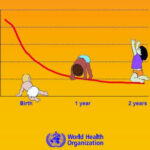Why Weight Gain During Menopause?
Menopause is a significant life transition, and weight gain is a common concern during this period. I remember speaking with my aunt about her experiences as she went through menopause. She mentioned how she had gradually gained weight despite not changing her diet or exercise routine significantly.
The hormonal changes that occur during menopause play a significant role in weight gain. As women age, their levels of estrogen decrease. Estrogen helps regulate body weight and fat distribution. With lower estrogen levels, many women find that they gain weight more easily and that fat tends to accumulate around the abdomen rather than the hips and thighs.
In addition to hormonal changes, the natural aging process can lead to a decrease in muscle mass and a slower metabolism, which also contribute to weight gain. My aunt mentioned how she felt her metabolism had slowed down considerably, making it harder to maintain her previous weight.
Lifestyle factors can exacerbate weight gain during menopause. The stress and mood swings that often accompany this life stage can lead to emotional eating or reduced motivation to exercise. My aunt admitted that she struggled with sleep disturbances and found herself turning to comfort foods more frequently.
To manage weight gain during menopause, my aunt made several lifestyle adjustments. She incorporated more strength training exercises to build muscle mass, which helped boost her metabolism. She also focused on a balanced diet, rich in lean proteins, whole grains, and healthy fats, while cutting back on sugary and processed foods.
Understanding that weight gain during menopause is a common issue and not a personal failure helped her approach this life stage with more compassion and realistic expectations. It’s a reminder that our bodies continue to change throughout our lives, and adapting to these changes is key to maintaining health and well-being.



